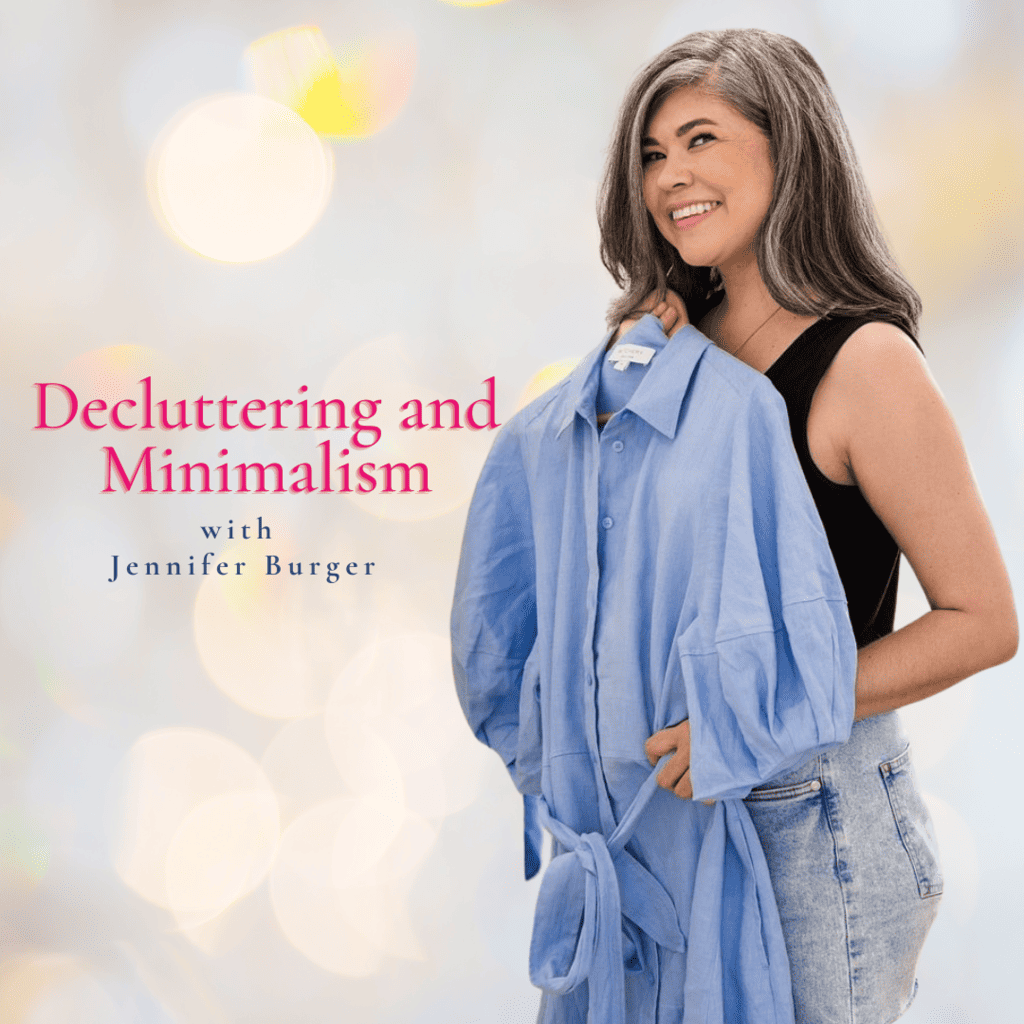Podcast: Play in new window | Download
Subscribe: Apple Podcasts | Spotify | Amazon Music | RSS | More
Minimalism and Decluttering with Jennifer Burger
Decluttering poses a significant challenge for many individuals, particularly women, highlighting the mental well-being and decision-making processes involved in the decluttering journey. As emphasized by Jennifer Burger, in this episode, clutter extends beyond mere possessions in our homes. It carries the stories of our lives and our relationship with these belongings. Initially insignificant, clutter can accumulate into a mental burden that weighs us down over time.
Approaching decluttering from an empowering standpoint can yield life-changing effects. This episode speaks to those grappling with decluttering challenges, offering resonance and understanding. The process of determining what to do with one’s clutter varies for each person, and in the broader context of decluttering solutions, there is no right or wrong strategy.
The Psychological Impact of Clutter
The psychological impact of clutter extends beyond the physical realm, influencing various aspects of our mental well-being. First, clutter can contribute to heightened stress levels and anxiety. Living in a chaotic environment can overwhelm the mind, making it challenging to focus and relax.
Second, clutter often reflects the state of one’s mind and emotions. A cluttered space can be symbolic of unresolved issues or emotional baggage. The reluctance to part with possessions may be tied to sentimental attachments or a fear of letting go, reflecting deeper psychological patterns.
Lastly, the psychological impact of clutter extends to our analytical processes. A cluttered space can impede our reasoning function, affecting decision-making and productivity. Thus, understanding and addressing the psychological impact of clutter is not only about tidying up physical spaces but also about promoting a healthier and more balanced state of mind.
Listen in to this episode to learn:
- Shopaholic turned minimalist
- Looking at clutter or spending habits differently, can help with decluttering
- The 2-part approach to decluttering with clothes
- How can women have that confidence with unfinished decisions on decluttering?
- Some examples of perspectives shifts with clarity and value work
- Decluttering strategies starting with the idea of clarity and creating boundaries for yourself
- Shame and moral judgment are the biggest obstacles to decluttering
- The 3-part process to overcome those hard feelings like shame.
- Pointers for listeners who are having a hard time letting go of things
- Where to connect with Jennifer Burger
Your clutter did not happen overnight!
Clutter is not an instantaneous occurrence; rather, it is developed over time through a series of small decisions and actions. It often starts with seemingly insignificant choices, such as being a shopaholic, keeping items that are no longer needed or neglecting to organize belongings regularly. As these behaviors persist, clutter slowly builds up, taking root in various areas of one’s living and working spaces.
Understanding that clutter is a gradual process helps individuals recognize that the current state of disarray is the result of a series of choices made over an extended period. This realization can be empowering because it shifts the focus from feeling overwhelmed by the immediate chaos to acknowledging the role of cumulative decisions in creating the cluttered environment. It also implies that decluttering is a step-by-step process, and just as clutter accumulates over time, it requires time and intentional effort to reverse.
Recognizing the gradual nature of clutter invites individuals to reflect on the underlying habits and patterns that contribute to the accumulation of belongings. It prompts a deeper exploration of the emotional attachments, procrastination tendencies, or organizational habits that may have led to the current state of clutter. By acknowledging the gradual development of clutter, individuals can approach the decluttering process with patience, understanding, and an intentional commitment to making sustained changes to prevent its recurrence.
Find support here:
⭐️Find the NEW LIFE AUDIT HERE
⭐️See if the Love Your Life School is open for enrollment here
⭐️Did you love this episode? Make sure you’ve listened to all the foundational episodes of the Love Your Life Show. Get the free Podcast Roadmap here
⭐️Do you get my weekly Wednesday email? I share a whole bunch of fun things, things that are happening in my life, products I’m using, books warriors are reading, etc! Come join the fun here!
⭐️Are we friends on Instagram? Let’s catch up!
⭐️I’ve been sharing videos of my life in Australia on Facebook – I’d love to be friends with you there too!
⭐️Grab some of my favorite books and products here
⭐️For the price of a coffee, Support Susie and the Love Your Life Show
⭐️Have a child between the ages of 9-25? Learn the basics to support your changing child here
How to Connect with Jennifer Burger:






